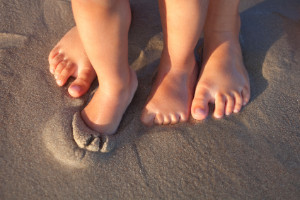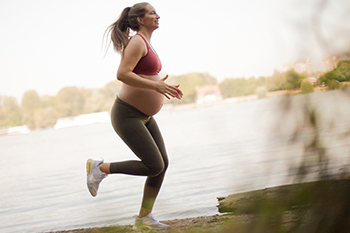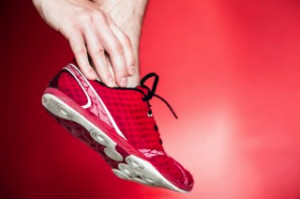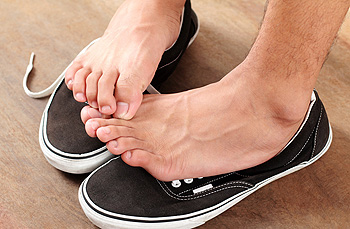

The journey from childhood to adulthood is marked by numerous transformations, and the evolution of your feet is no exception. Children's feet, characterized by their pliability and cartilage dominance, are more susceptible to external influences. Their arches may appear flat, and the bones are still developing. As children age, these structures solidify, forming the more defined arches and shapes typical of adult feet. Moreover, the fat pads on children's feet provide natural cushioning, while adults may experience thinning of these pads over time. The growth patterns and proportions differ significantly, with children's feet being relatively wider in comparison to their length. Recognizing these distinctions is vital for selecting appropriate footwear and addressing potential concerns in either developmental stage. If you would like additional knowledge about how adult and children’s feet vary, it is suggested that you confer with a podiatrist.
The health of a child’s feet is vital to their overall well-being. If you have any questions regarding foot health, contact Dr. Edward D. Hutson of Easton, PA. . Our doctor can provide the care you need to keep you pain-free and on your feet.
Tips for Keeping Children's Feet Healthy
If you have any questions, please feel free to contact our offices located in Easton, and Northampton, PA . We offer the newest diagnostic and treatment technologies for all your foot care needs.

Pregnancy is a transformative journey that brings about numerous changes in a woman's body. While most expectant mothers are well aware of the more obvious alterations, such as weight gain and a growing belly, the potential impact on foot size is a less commonly discussed topic. Many women wonder if their feet will permanently change in size during pregnancy. The answer, in most cases, is possibly. During pregnancy, hormonal changes, particularly the release of relaxin, can affect the ligaments in the body, including those in the feet. This increased flexibility may lead to a temporary, and sometimes permanent, increase in foot size. Additionally, as pregnancy progresses, fluid retention and swelling, known as edema, can cause the feet to become temporarily larger. While swelling typically subsides after childbirth, some women may find that their feet remain slightly larger than they were before pregnancy. Overall, it is important for expectant mothers to be prepared for these potential changes, and consider investing in comfortable, supportive footwear during and after pregnancy to ensure proper foot health and comfort. If you would like more information about how pregnancy can affect the feet, it is suggested that you confer with a podiatrist.
Pregnant women with swollen feet can be treated with a variety of different methods that are readily available. For more information about other cures for swollen feet during pregnancy, consult with Dr. Edward D. Hutson from Easton, PA. . Our doctor will attend to all of your foot and ankle needs.
What Foot Problems Can Arise During Pregnancy?
One problem that can occur is overpronation, which occurs when the arch of the foot flattens and tends to roll inward. This can cause pain and discomfort in your heels while you’re walking or even just standing up, trying to support your baby.
Another problem is edema, or swelling in the extremities. This often affects the feet during pregnancy but tends to occur in the later stages.
How Can I Keep My Feet Healthy During Pregnancy?
If you have any questions please feel free to contact our offices located in Easton, and Northampton, PA . We offer the newest diagnostic and treatment technologies for all your foot and ankle needs.

Runners visit podiatrists for initial consultations on lower extremity injuries, knowing that identifying the cause is as important as addressing the symptoms. As a practitioner, gaining a runner's trust is essential, which involves showing understanding of their training and equipment, plus being attentive to their detailed injury accounts. A thorough examination is critical, including both static biomechanical and dynamic gait assessments. This is ideally done with the runner in their usual footwear and attire for complete lower extremity visibility. Common injuries among runners can include plantar fasciitis, Achilles tendon injuries, and stress fractures. Regardless of the injury, the aim of treating runners is to ensure their swift yet secure comeback to running. Important to treatment is effective communication and aligning expectations regarding outcomes which are key to supporting patients and helping them stay balanced through challenging periods of recovery. If you are a runner and have experienced a foot or ankle injury, it is suggested that you make an appointment with a podiatrist who can offer appropriate injury prevention techniques.
All runners should take extra precaution when trying to avoid injury. If you have any concerns about your feet, contact Dr. Edward D. Hutson of Easton, PA. . Our doctor will treat your foot and ankle needs.
How to Prevent Running Injuries
There are a lot of mistakes a runner can make prior to a workout that can induce injury. A lot of athletes tend to overstretch before running, instead of saving those workouts for a post-run routine. Deep lunges and hand-to-toe hamstring pulls should be performed after a workout instead of during a warmup. Another common mistake is jumping into an intense routine before your body is physically prepared for it. You should try to ease your way into long-distance running instead of forcing yourself to rush into it.
More Tips for Preventing Injury
If you have any questions, please feel free to contact our offices located in Easton, and Northampton, PA . We offer the newest diagnostic and treatment technologies for all your foot care needs.

Itchy feet can be a bothersome issue, but they are often mild and temporary. Common symptoms associated with itchy feet include the formation of crust as a wound heals, and flaky or peeling skin due to extreme dryness, rashes, redness, warmth, and swelling. Sometimes, itchy feet can lead to pus-filled blisters or general tenderness and discomfort. In certain circumstances having itchy feet may necessitate a visit to a podiatrist, such as if you develop oozing blisters or feel a worm-like tingling sensation in your feet. Persistent itching that lasts for more than two weeks or recurrent flare-ups may signal a more serious issue. If the itching spreads to other areas of your body, it's probably a good idea to consult a podiatrist. In some cases, itchy feet can be a sign of underlying health problems. For instance, swelling in the legs, arms, and stomach, yellowish skin or eyes, or reduced urinary output could indicate kidney or liver issues. When these symptoms are present alongside itchy feet, it may be an indicator of potential systemic concerns. If you experience persistent or recurring foot itching, especially if it spreads to other areas of your body and occurs during pregnancy or menopause, it is suggested that you make an appointment with a podiatrist for a complete examination and suggestions for treatment.
Everyday foot care is very important to prevent infection and other foot ailments. If you need your feet checked, contact Dr. Edward D. Hutson from Easton, PA. . Our doctor can provide the care you need to keep you pain-free and on your feet.
Everyday Foot Care
Often, people take care of their bodies, face and hair more so than they do for their feet. But the feet are a very important aspect of our bodies, and one that we should pay more attention to. Without our feet, we would not be able to perform most daily tasks.
It is best to check your feet regularly to make sure there are no new bruises or cuts that you may not have noticed before. For dry feet, moisturizer can easily be a remedy and can be applied as often as necessary to the affected areas. Wearing shoes that fit well can also help you maintain good foot health, as well as making it easier to walk and do daily activities without the stress or pain of ill-fitting shoes, high heels, or even flip flops. Wearing clean socks with closed shoes is important to ensure that sweat and bacteria do not accumulate within the shoe. Clean socks help to prevent Athlete’s foot, fungi problems, bad odors, and can absorb sweat.
If you have any questions please feel free to contact our offices located in Easton, and Northampton, PA . We offer the newest diagnostic and treatment technologies for all your foot and ankle needs.